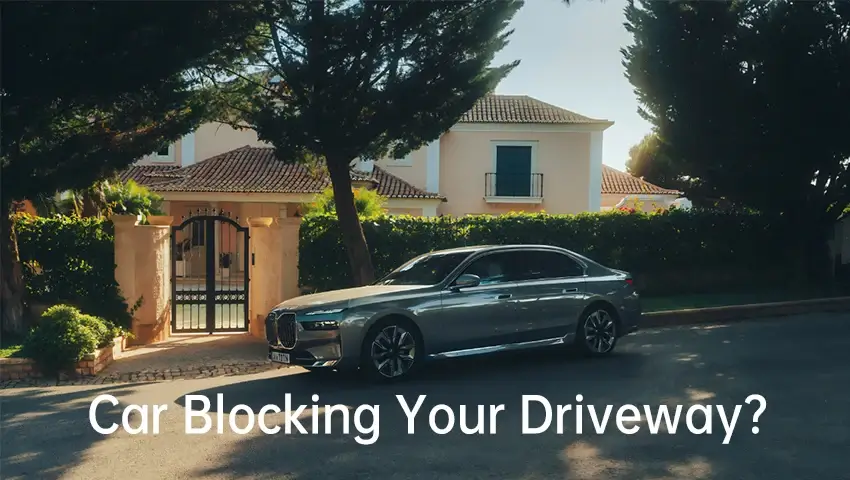Having an unfamiliar car parked in your driveway can be a major inconvenience. It disrupts your day, delays your plans, and creates unnecessary stress. More importantly, it raises questions about your rights and the appropriate steps to take in such a situation. In this comprehensive guide, we’ll walk you through what to do if someone parks in your driveway, explain your legal options, and offer preventive strategies to avoid future incidents.
Contents
What to Do if Someone Parks in Your Driveway? Dos and Don’ts
Dos:
- Remain Calm: Your first instinct may be to feel frustrated or angry, but it’s important to stay composed. An aggressive reaction can escalate the situation, leading to unnecessary conflict.
- Look for the Owner: Start by checking with nearby homes or businesses. The car owner may not realize that they’re causing an issue. A polite inquiry could resolve the problem quickly without further steps.
- Document the Situation: If the owner isn’t found or refuses to move the car, take pictures or videos of the vehicle, clearly capturing the license plate, make, and model. This documentation could be crucial if legal action is necessary.
- Call Local Law Enforcement: If the car is left in your driveway for an extended period or blocks your access, contact the police on their non-emergency line. Provide detailed information such as the vehicle description and location. Depending on local laws, law enforcement may ticket or arrange for the car to be towed.
Don’ts:
- Avoid Confrontation: Confronting the owner aggressively can lead to an escalation that may become dangerous or legally problematic. Always approach any communication with the car owner respectfully and calmly.
- Do Not Attempt to Move the Car Yourself: Trying to push or move the vehicle on your own poses safety risks and legal implications. Only licensed professionals should handle the moving or towing of a car.
Can I Tow a Car Blocking My Driveway?
1. Legal Considerations:
Before calling a towing company, familiarize yourself with local regulations. In many areas, homeowners have the right to tow vehicles from their property, but the process often requires police involvement or adherence to specific procedures.
2. Steps for Towing:
Contact a Licensed Towing Service: Ensure that the company you hire is licensed and familiar with local laws related to private property towing.
Inform the Police: Some jurisdictions mandate that you notify law enforcement before towing a car. This step prevents misunderstandings and avoids the vehicle being reported as stolen.
How to Report a Car Blocking My Driveway?
1. Calling the Police:
In most cases, contacting the police is the first step. Use the non-emergency number to avoid tying up emergency services. When the police arrive, they may run the car’s license plate and attempt to contact the owner. If the vehicle is illegally parked, they might issue a ticket or authorize a tow.
2. Information to Provide:
- Vehicle details: make, model, and color.
- License plate number.
- The duration the car has been parked in your driveway.
3. Using Non-Emergency Lines:
For non-urgent situations, use non-emergency police lines to report the issue. This helps reserve 911 calls for actual emergencies and ensures a timely response for parking complaints.
4. Local Reporting Tools:
Some cities have specific tools or apps for residents to report parking violations. Check your local government’s website to see if such digital resources are available.
How to Prevent Cars from Blocking Your Driveway in the Future
1. Install Clear Signage:
Posting signs like “No Parking – Driveway in Use” or “Private Property – Unauthorized Vehicles Will Be Towed” can deter potential violators and establish clear boundaries.
2. Driveway Markings:
Painting boundary lines or using reflective tape can visually emphasize the area as part of your property, making it less likely for others to park there.
3. Install Security Cameras:
A visible security camera can act as a deterrent and provide evidence if a car blocks your driveway again. Recorded footage can be useful when reporting to authorities or as evidence if you need to escalate the situation.
4K/5MP Pan-Tilt Wi-Fi 6 Camera Systems - C296 Series
- 4K/5MP Super HD
- Color Night Vision
- Human Auto Tracking
- Person Vehicle Detection
- Spotlight & Sound Siren
- Two-way Audio
- Present Points
- Customized Alerts
- Detection Zone
- HDD Storage
4. Community Outreach:
Building good relationships with your neighbors and engaging in community discussions can help create awareness and mutual respect for each other’s property. A community-focused approach can prevent misunderstandings and foster better neighborhood cooperation.
5. Parking Barriers:
For more direct prevention, consider installing physical barriers like fold-down posts at the entrance to your driveway. These barriers provide an extra level of security but should be used in a way that complies with local ordinances.
Is It Illegal to Block a Driveway?
- General Laws: Blocking a driveway is generally considered illegal in most countries. However, the exact regulations and consequences vary based on local and national laws. Whether you live in the United States, the United Kingdom, or Canada, it’s essential to understand the specific rules applicable in your region to determine your rights and potential actions.
- United States: In the U.S., laws regarding blocking driveways are typically enforced at the state or city level. Generally, it is illegal to park in a way that obstructs access to a private driveway. Violators can face fines, and their vehicles can be towed at the owner’s expense. For example, in California, state law (California Vehicle Code 22500(e)) prohibits stopping or parking in front of a public or private driveway. Exceptions might be made for emergency vehicles or with special permits. Each city or municipality may have additional regulations, so it’s important to consult local ordinances.
- United Kingdom: In the U.K., it is also unlawful to block a driveway, though the laws are specific about public versus private property. The Highway Code states that you must not park in front of an entrance to a property or obstruct a road with a parked vehicle. However, enforcement can vary depending on whether the car is parked on public or private land. If a vehicle blocks a driveway from the road, authorities can often take action. However, if the vehicle is entirely on private property, like inside the boundaries of your driveway, local councils may not have the power to intervene, and it could become a civil issue.
- Canada: In Canada, the legality of parking and blocking driveways is regulated at the provincial and municipal levels. Most cities have by-laws that prohibit obstructing driveways. For instance, in Toronto, it is illegal to park in a way that blocks a driveway, and fines can be issued. In some cases, authorities may tow the offending vehicle if it poses a safety hazard or disrupts traffic. In rural or less regulated areas, enforcement may vary, and contacting local authorities for guidance is recommended.
- Consequences for Offenders: Blocking a driveway can lead to different penalties depending on where you live. In most U.S. states, fines can range from $50 to over $150, and towing fees can add additional costs. In the U.K., fines can be issued, and persistent offenders may face more severe consequences. In Canada, municipal by-laws determine the fine amounts, and towing may be employed for vehicles that pose significant obstructions.
- Local Variations: Laws can differ widely not only between countries but even within cities or towns in the same country. For example, some U.S. cities may have stricter parking regulations, and special zones may have designated no-parking areas near driveways. Always check with your local government or municipal office for the most specific and relevant information regarding parking and driveway obstruction.
FAQs
1. Can I be fined if I block my own driveway?
Generally, no. However, if the driveway extends into public property or violates local regulations, you could face penalties.
2. What should I do if a car blocks my driveway late at night?
Follow the same steps as during the day: document the situation, try to locate the owner, and contact local law enforcement if needed.
3. How long should I wait before calling a tow truck?
This depends on local regulations. In some places, you may need to wait a specific amount of time before contacting a towing service.
4. Is it legal to use a warning sign with threats of towing?
In most areas, yes. However, the wording of the sign should comply with local laws.
5. What can I do if the same car repeatedly blocks my driveway?
If the problem is persistent, keep a record of each incident and escalate the matter to local authorities or a community association for support.
Conclusion
Understanding your rights and the correct procedures to follow when a car blocks your driveway is crucial for a quick resolution. By staying informed, documenting situations, and following local regulations, you can handle the problem effectively. Take preventive measures like installing signage and security cameras to reduce the likelihood of future issues. If you’ve faced similar challenges or have questions, feel free to share your experiences or ask in the comments section.

